人教版(2019)必修第三册 Unit 2 Morals and Virtues Discovering useful structures 课件(31张PPT)
文档属性
| 名称 | 人教版(2019)必修第三册 Unit 2 Morals and Virtues Discovering useful structures 课件(31张PPT) |  | |
| 格式 | pptx | ||
| 文件大小 | 1009.3KB | ||
| 资源类型 | 教案 | ||
| 版本资源 | 人教版(2019) | ||
| 科目 | 英语 | ||
| 更新时间 | 2023-05-18 14:56:17 | ||
图片预览


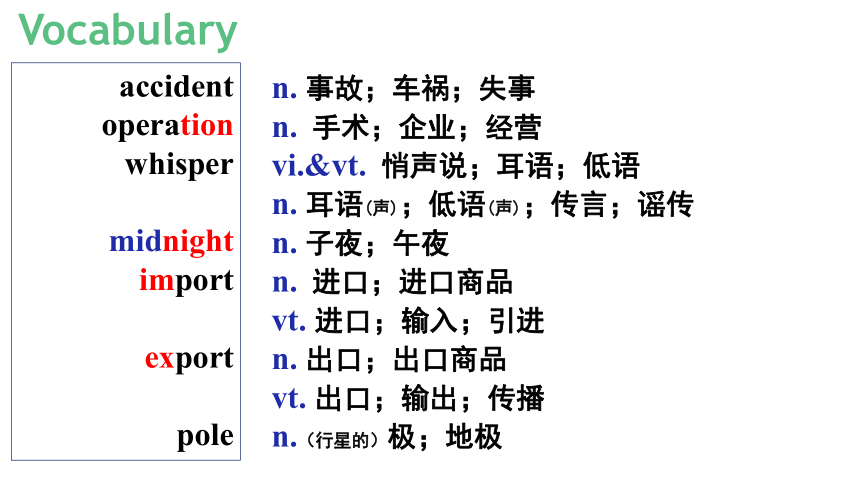
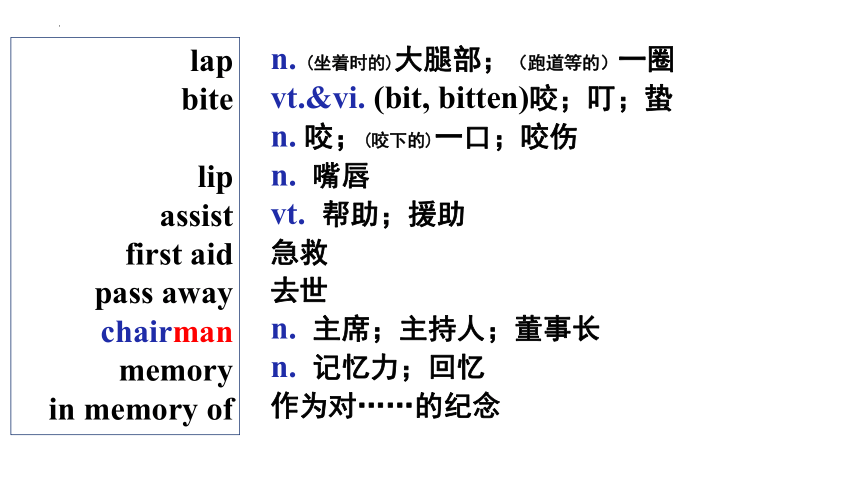
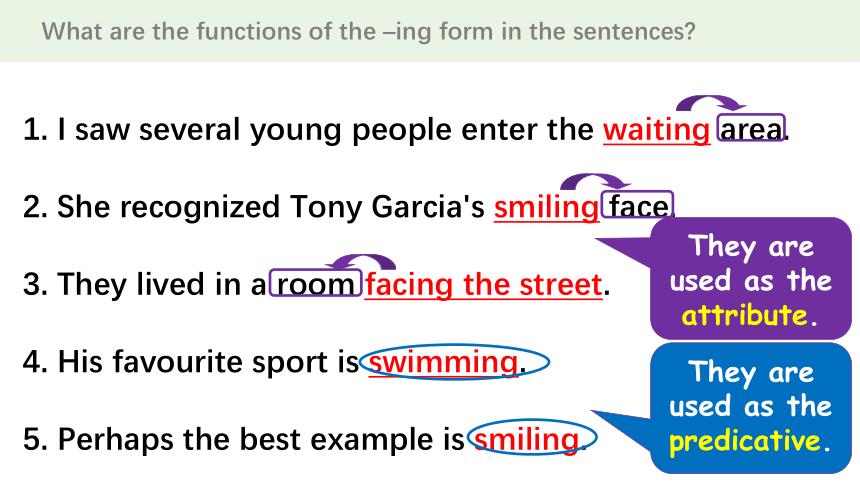
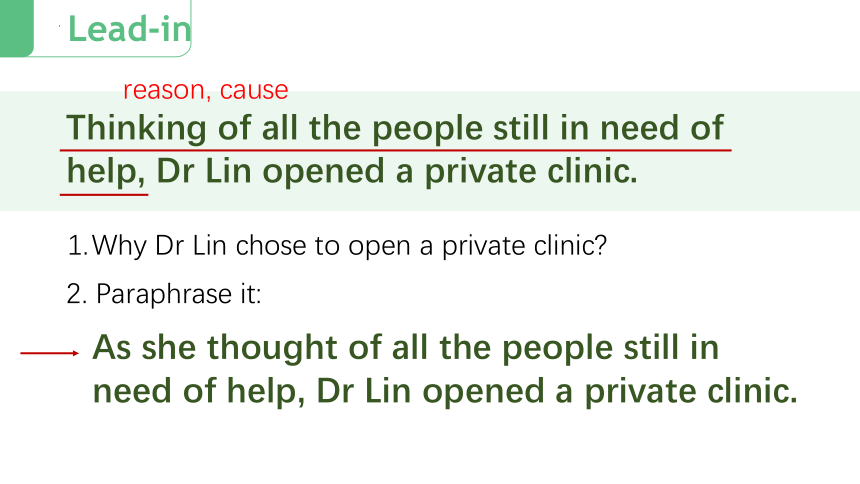
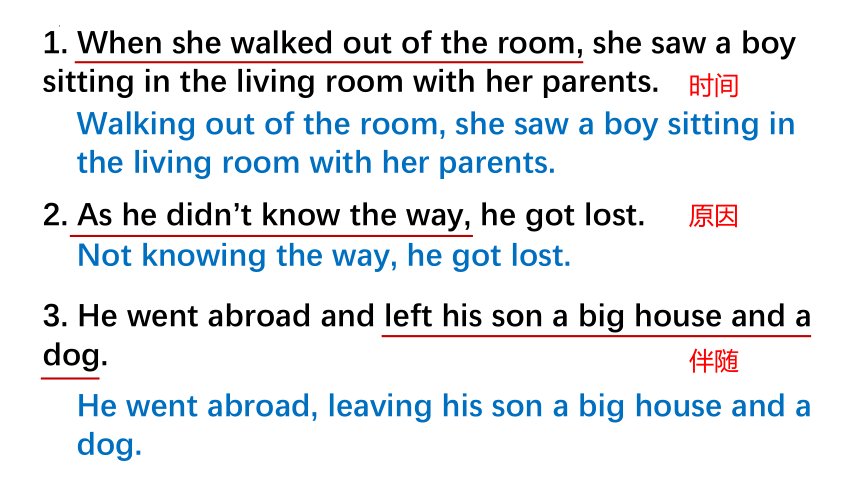
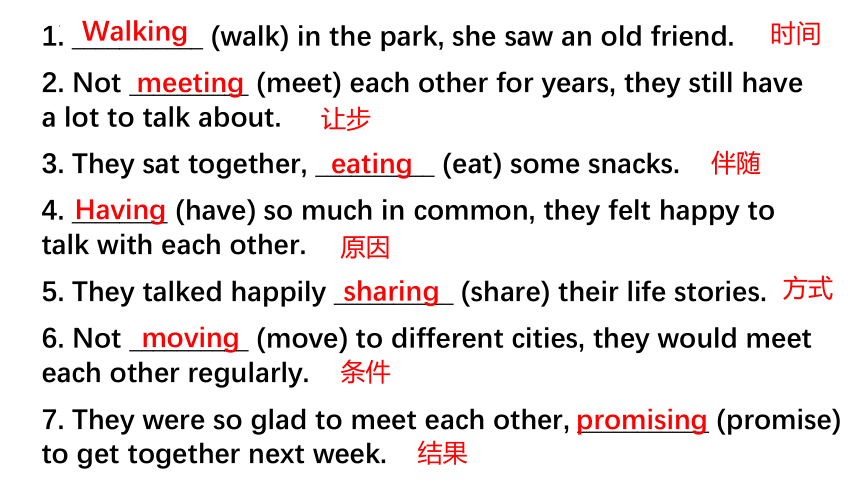

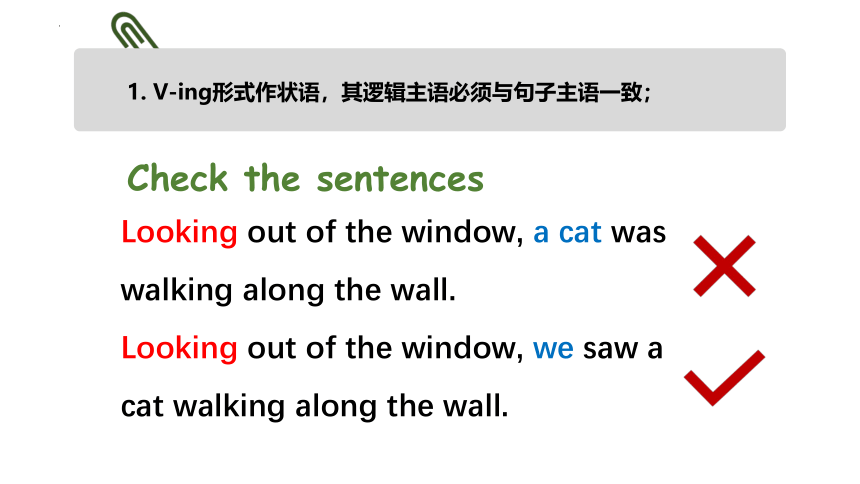
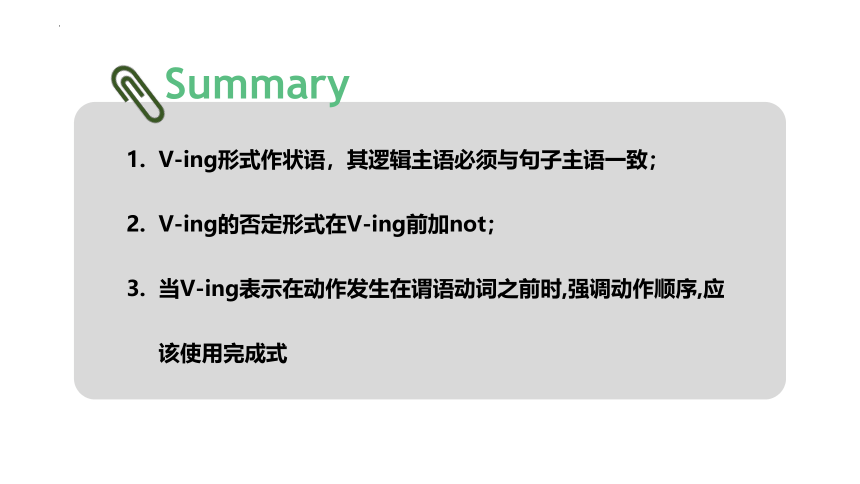
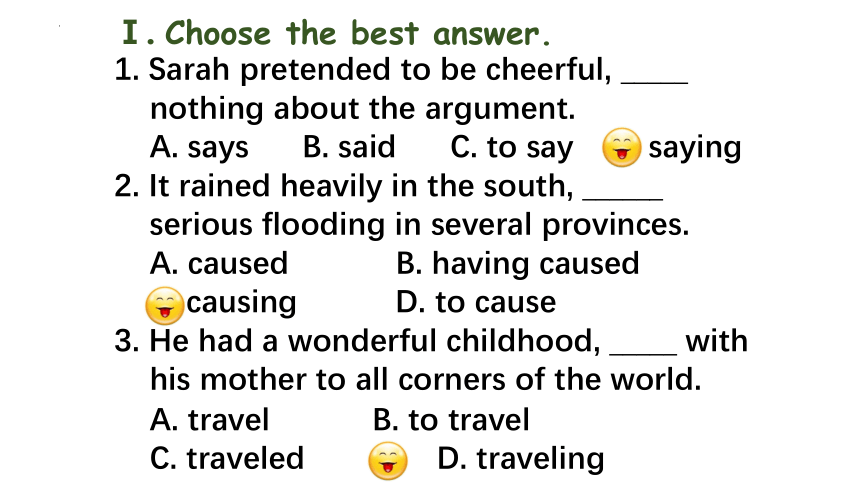
文档简介
(共31张PPT)
MORALS AND VIRTUES
UNIT
2
PART 3
Discovering Useful Structures
Vocabulary
accident
operation
whisper
midnight
import
export
pole
n. 事故;车祸;失事
n. 手术;企业;经营
vi.&vt. 悄声说;耳语;低语
n. 耳语(声);低语(声);传言;谣传
n. 子夜;午夜
n. 进口;进口商品
vt. 进口;输入;引进
n. 出口;出口商品
vt. 出口;输出;传播
n.(行星的)极;地极
lap
bite
lip
assist
first aid
pass away
chairman
memory
in memory of
n. (坐着时的)大腿部;(跑道等的)一圈
vt.&vi. (bit, bitten)咬;叮;蛰
n. 咬;(咬下的)一口;咬伤
n. 嘴唇
vt. 帮助;援助
急救
去世
n. 主席;主持人;董事长
n. 记忆力;回忆
作为对……的纪念
1. I saw several young people enter the waiting area.
2. She recognized Tony Garcia's smiling face.
3. They lived in a room facing the street.
4. His favourite sport is swimming.
5. Perhaps the best example is smiling.
They are used as the attribute.
They are used as the predicative.
What are the functions of the –ing form in the sentences
Lead-in
Thinking of all the people still in need of help, Dr Lin opened a private clinic.
reason, cause
Why Dr Lin chose to open a private clinic
As she thought of all the people still in need of help, Dr Lin opened a private clinic.
2. Paraphrase it:
Not knowing the way, he got lost.
1. When she walked out of the room, she saw a boy sitting in the living room with her parents.
2. As he didn’t know the way, he got lost.
3. He went abroad and left his son a big house and a dog.
时间
原因
伴随
Walking out of the room, she saw a boy sitting in the living room with her parents.
He went abroad, leaving his son a big house and a dog.
1. ___________ (walk) in the park, she saw an old friend.
2. Not __________ (meet) each other for years, they still have a lot to talk about.
3. They sat together, __________ (eat) some snacks.
4. ________ (have) so much in common, they felt happy to talk with each other.
5. They talked happily __________ (share) their life stories.
6. Not __________ (move) to different cities, they would meet each other regularly.
7. They were so glad to meet each other, ___________ (promise) to get together next week.
Walking
meeting
eating
Having
sharing
moving
promising
时间
让步
伴随
原因
方式
条件
结果
Summary
V-ing形式作状语,其逻辑主语与句子主语一致,可以表示时间、条件、原因、结果、让步、伴随等等
状语(adverbial)是句子的一个重要修饰成分。从情况、时间、方式、条件、对象、范围和程度等方面对谓语中心词进行修饰、限制。英语状语修饰动词、形容词、副词或整个句子
1. V-ing形式作状语,其逻辑主语必须与句子主语一致;
Looking out of the window, a cat was walking along the wall.
Looking out of the window, we saw a cat walking along the wall.
Check the sentences
Summary
V-ing形式作状语,其逻辑主语必须与句子主语一致;
V-ing的否定形式在V-ing前加not;
当V-ing表示在动作发生在谓语动词之前时,强调动作顺序,应该使用完成式
Ⅰ. Choose the best answer.
1. Sarah pretended to be cheerful, _____
nothing about the argument.
A. says B. said C. to say D. saying
2. It rained heavily in the south, ______
serious flooding in several provinces.
A. caused B. having caused
C. causing D. to cause
3. He had a wonderful childhood, _____ with
his mother to all corners of the world.
A. travel B. to travel
C. traveled D. traveling
4. The news shocked the public, ______ to
great concern about students' safety at
school.
A. having led B. led
C. leading D. to lead
5. More highways have been built in China,
_____ it much easier for people to travel
from one place to another.
A. making B. made
C. to make D. having made
2. V-ing的否定形式在V-ing前加not;
e.g. As the teacher didn’t see the homework, she asked the students to submit their homework immediately.
Not seeing the homework, the teacher asked the students to submit their homework immediately.
1. _______________ (not know) his address, I
couldn't go to see him yesterday.
2. They are visitors _________ (come) from
several countries.
3. ___________________________ (not invite) to
the party, Mary was greatly hurt.
4. He dived into the water, _________ (leave)
only his face exposed(暴露).
5. _______ (take) a deep breath, they dived
into the water.
Not knowing
coming
Not having been invited
Ⅱ. Fill in the blanks.
leaving
Taking
3. 当V-ing表示在动作发生在谓语动词之前时,强调动作顺序,应该使用完成式.
e.g. After he finished his homework, he rushed to watch his favorite variety show.
Having finished his homework, he rushed to watch his favorite variety show.
-ing 时态和语态
主 动 被 动
一般
完成
否定式 doing
being done
having done
having been done
not+-ing / not+having done
1. I felt somebody standing behind me.
2. I saw the little boy crying there.
3. We kept the fire burning all night long.
4. I won’t have you running about in the room.
5. I couldn’t do my homework with the noise going on.
6. With so many people looking at her, she felt nervous.
object complement
1. -ing形式作宾语补足语常放在宾语后面,表示一个正在进行的主动性的动作,强调一个过程或一种状态。
1. I found a bag lying on the ground.
2. When we returned to the school, we found a stranger standing at the entrance.
3. Along the way, we saw many people playing music, singing, and dancing.
4. She heard someone knocking at the door.
1. They found a dog sleeping on the street.
2. They heard him singing in next room.
3. We mustn't keep them waiting.
= The dog was found sleeping on the street.
= He was heard singing in the next room.
= They mustn't be kept waiting.
2. 当主句转换为被动结构时,原来作宾语补足语的-ing形式便转换为主语补足语。
1. 1. We saw a light burning in the window.
2. I felt somebody patting me on the shoulder.
3. Can you smell anything burning
4. As he spoke, he observed everybody looking at him curiously.
5. Listen to the birds singing.
6. I didn't notice him waiting.
①. 感官动词+ sb/sth + doing sth (as object complement)
表示感觉和心理状态的动词,常见的有:
see, hear, feel, smell, find, notice, observe, look at, listen to … …
1. I won't have you doing that.
2. This set me thinking.
3. I'm sorry to have kept you waiting.
4. I can't get the clock going again.
5. You won't catch me doing that again.
6. He walked off and left me sitting there alone.
②. 使役动词+ sb/sth + doing sth (as object complement)
表示指使意义的动词,常见的有:
have, let, keep, get, leave … …
③. with + n./pron. + doing sth (as object complement)
5. I couldn’t do my homework with the noise going on.
6. With so many people looking at her, she felt nervous.
Summary
能用-ing形式作宾语补足语的几类动词:
感官动词+ sb/sth + doing sth (as object complement)
使役动词+ sb/sth + doing sth (as object complement)
with + n./pron. + doing sth (as object complement)
making
单句填空
1. We passed by the classroom and saw the teacher _______ the experiment.
2. We sat an hour and watched the teacher _______ the experiment.
When we get to the party, we heard someone playing the guitar.
In the party, we heard someone play the guitar.
make
Tips
doing:表示动作正在进行
do:表示(或强调)动作从开始到结束的全过程
see, hear, feel, watch等动词之后用-ing形式和动词不定式作宾语补足语的区别:
see/ hear/ feel/
watch …
+
Let’s review
Adverbial
Object complement
V-ing形式作状语,其逻辑主语必须与句子主语一致;
V-ing的否定形式在V-ing前加not;
当V-ing表示在动作发生在谓语动词之前时,强调动作顺序,应该使用完成式
-ing形式作宾语补足语常放在宾语后面,表示一个正在进行的主动性的动作,强调一个过程或一种状态。
当主句转换为被动结构时,原来宾语补的-ing形式便转换为主补。
与感官动词,使役动词,with 构成复合结构
Task 1
Read the sentence below and discuss the function and mening of each –ing form. Then find more examples from the unit.
… her brother complained, thinking of the high tuition fees.
Thinking of all the people still in need of help, Dr Lin opened a private clinic.
The new People’s Republic of China saw Dr Lin Qiaozhi playing a key role.
adverbial
adverbial
object complement
Task 2
Complete the sentences with the correct forms of the verbs in the box
_________ that his wife had been injured in an accident, Mr Johnson hurried to the hospital.
During the operation, she sat in the waiting room for over an hour ____________ about him.
I saw her whispering something into his ear, obviously not __________ to be heard.
He suddenly woke up at midnight when he heard someone __________ at his door.
Hearing
worrying
wanting
feel
want
face
smile
return
worry
hear
knock
knocking
Task 2
Complete the sentences with the correct forms of the verbs in the box
__________ higher import and export costs, the company is looking for ways to survive.
___________ from the North Pole, the traveller wrote a book about his experience and had it published the following year.
The child lay on her mother’s lap, _________ sweetly.
__________ hurt by the rejection, she bit her lip and quietly walked away.
Facing
Returning
smiling
feel
want
face
smile
return
worry
hear
knock
Feeling
Task 3
Read the following story and rewrite the underline parts using the –ing form.
①
②
③
④
③ Helping to organise hospitals, he taught doctors and nurses, and showed people how to give first aid. / He helped to organise hospitals, teaching doctors and nurses, and showing people how to give first aid.
① … he became very interested in medicine, deciding to become a doctor.
② … after hearing that many people were dying in the war.
④ … praising Dr Bethune as a hero to be remembered in China.
1. They use computers to keep the machine _________ (run) smoothly.
2. The old couple often take a walk after supper in the park with their pet dog ____________ (follow)them.
running
following
3. He had the wall _________ (paint).
painted
4. I suddenly felt myself ___________ (hit) by a heavily fist.
being hit
5. I found a beggar ___________ (stand) at the door.
standing
6. With all fans _________ (sing) together, he felt so proud.
singing
7. He wants to have his eyes ___________ (examine) tomorrow.
examined
Exercise
MORALS AND VIRTUES
UNIT
2
PART 3
Discovering Useful Structures
Vocabulary
accident
operation
whisper
midnight
import
export
pole
n. 事故;车祸;失事
n. 手术;企业;经营
vi.&vt. 悄声说;耳语;低语
n. 耳语(声);低语(声);传言;谣传
n. 子夜;午夜
n. 进口;进口商品
vt. 进口;输入;引进
n. 出口;出口商品
vt. 出口;输出;传播
n.(行星的)极;地极
lap
bite
lip
assist
first aid
pass away
chairman
memory
in memory of
n. (坐着时的)大腿部;(跑道等的)一圈
vt.&vi. (bit, bitten)咬;叮;蛰
n. 咬;(咬下的)一口;咬伤
n. 嘴唇
vt. 帮助;援助
急救
去世
n. 主席;主持人;董事长
n. 记忆力;回忆
作为对……的纪念
1. I saw several young people enter the waiting area.
2. She recognized Tony Garcia's smiling face.
3. They lived in a room facing the street.
4. His favourite sport is swimming.
5. Perhaps the best example is smiling.
They are used as the attribute.
They are used as the predicative.
What are the functions of the –ing form in the sentences
Lead-in
Thinking of all the people still in need of help, Dr Lin opened a private clinic.
reason, cause
Why Dr Lin chose to open a private clinic
As she thought of all the people still in need of help, Dr Lin opened a private clinic.
2. Paraphrase it:
Not knowing the way, he got lost.
1. When she walked out of the room, she saw a boy sitting in the living room with her parents.
2. As he didn’t know the way, he got lost.
3. He went abroad and left his son a big house and a dog.
时间
原因
伴随
Walking out of the room, she saw a boy sitting in the living room with her parents.
He went abroad, leaving his son a big house and a dog.
1. ___________ (walk) in the park, she saw an old friend.
2. Not __________ (meet) each other for years, they still have a lot to talk about.
3. They sat together, __________ (eat) some snacks.
4. ________ (have) so much in common, they felt happy to talk with each other.
5. They talked happily __________ (share) their life stories.
6. Not __________ (move) to different cities, they would meet each other regularly.
7. They were so glad to meet each other, ___________ (promise) to get together next week.
Walking
meeting
eating
Having
sharing
moving
promising
时间
让步
伴随
原因
方式
条件
结果
Summary
V-ing形式作状语,其逻辑主语与句子主语一致,可以表示时间、条件、原因、结果、让步、伴随等等
状语(adverbial)是句子的一个重要修饰成分。从情况、时间、方式、条件、对象、范围和程度等方面对谓语中心词进行修饰、限制。英语状语修饰动词、形容词、副词或整个句子
1. V-ing形式作状语,其逻辑主语必须与句子主语一致;
Looking out of the window, a cat was walking along the wall.
Looking out of the window, we saw a cat walking along the wall.
Check the sentences
Summary
V-ing形式作状语,其逻辑主语必须与句子主语一致;
V-ing的否定形式在V-ing前加not;
当V-ing表示在动作发生在谓语动词之前时,强调动作顺序,应该使用完成式
Ⅰ. Choose the best answer.
1. Sarah pretended to be cheerful, _____
nothing about the argument.
A. says B. said C. to say D. saying
2. It rained heavily in the south, ______
serious flooding in several provinces.
A. caused B. having caused
C. causing D. to cause
3. He had a wonderful childhood, _____ with
his mother to all corners of the world.
A. travel B. to travel
C. traveled D. traveling
4. The news shocked the public, ______ to
great concern about students' safety at
school.
A. having led B. led
C. leading D. to lead
5. More highways have been built in China,
_____ it much easier for people to travel
from one place to another.
A. making B. made
C. to make D. having made
2. V-ing的否定形式在V-ing前加not;
e.g. As the teacher didn’t see the homework, she asked the students to submit their homework immediately.
Not seeing the homework, the teacher asked the students to submit their homework immediately.
1. _______________ (not know) his address, I
couldn't go to see him yesterday.
2. They are visitors _________ (come) from
several countries.
3. ___________________________ (not invite) to
the party, Mary was greatly hurt.
4. He dived into the water, _________ (leave)
only his face exposed(暴露).
5. _______ (take) a deep breath, they dived
into the water.
Not knowing
coming
Not having been invited
Ⅱ. Fill in the blanks.
leaving
Taking
3. 当V-ing表示在动作发生在谓语动词之前时,强调动作顺序,应该使用完成式.
e.g. After he finished his homework, he rushed to watch his favorite variety show.
Having finished his homework, he rushed to watch his favorite variety show.
-ing 时态和语态
主 动 被 动
一般
完成
否定式 doing
being done
having done
having been done
not+-ing / not+having done
1. I felt somebody standing behind me.
2. I saw the little boy crying there.
3. We kept the fire burning all night long.
4. I won’t have you running about in the room.
5. I couldn’t do my homework with the noise going on.
6. With so many people looking at her, she felt nervous.
object complement
1. -ing形式作宾语补足语常放在宾语后面,表示一个正在进行的主动性的动作,强调一个过程或一种状态。
1. I found a bag lying on the ground.
2. When we returned to the school, we found a stranger standing at the entrance.
3. Along the way, we saw many people playing music, singing, and dancing.
4. She heard someone knocking at the door.
1. They found a dog sleeping on the street.
2. They heard him singing in next room.
3. We mustn't keep them waiting.
= The dog was found sleeping on the street.
= He was heard singing in the next room.
= They mustn't be kept waiting.
2. 当主句转换为被动结构时,原来作宾语补足语的-ing形式便转换为主语补足语。
1. 1. We saw a light burning in the window.
2. I felt somebody patting me on the shoulder.
3. Can you smell anything burning
4. As he spoke, he observed everybody looking at him curiously.
5. Listen to the birds singing.
6. I didn't notice him waiting.
①. 感官动词+ sb/sth + doing sth (as object complement)
表示感觉和心理状态的动词,常见的有:
see, hear, feel, smell, find, notice, observe, look at, listen to … …
1. I won't have you doing that.
2. This set me thinking.
3. I'm sorry to have kept you waiting.
4. I can't get the clock going again.
5. You won't catch me doing that again.
6. He walked off and left me sitting there alone.
②. 使役动词+ sb/sth + doing sth (as object complement)
表示指使意义的动词,常见的有:
have, let, keep, get, leave … …
③. with + n./pron. + doing sth (as object complement)
5. I couldn’t do my homework with the noise going on.
6. With so many people looking at her, she felt nervous.
Summary
能用-ing形式作宾语补足语的几类动词:
感官动词+ sb/sth + doing sth (as object complement)
使役动词+ sb/sth + doing sth (as object complement)
with + n./pron. + doing sth (as object complement)
making
单句填空
1. We passed by the classroom and saw the teacher _______ the experiment.
2. We sat an hour and watched the teacher _______ the experiment.
When we get to the party, we heard someone playing the guitar.
In the party, we heard someone play the guitar.
make
Tips
doing:表示动作正在进行
do:表示(或强调)动作从开始到结束的全过程
see, hear, feel, watch等动词之后用-ing形式和动词不定式作宾语补足语的区别:
see/ hear/ feel/
watch …
+
Let’s review
Adverbial
Object complement
V-ing形式作状语,其逻辑主语必须与句子主语一致;
V-ing的否定形式在V-ing前加not;
当V-ing表示在动作发生在谓语动词之前时,强调动作顺序,应该使用完成式
-ing形式作宾语补足语常放在宾语后面,表示一个正在进行的主动性的动作,强调一个过程或一种状态。
当主句转换为被动结构时,原来宾语补的-ing形式便转换为主补。
与感官动词,使役动词,with 构成复合结构
Task 1
Read the sentence below and discuss the function and mening of each –ing form. Then find more examples from the unit.
… her brother complained, thinking of the high tuition fees.
Thinking of all the people still in need of help, Dr Lin opened a private clinic.
The new People’s Republic of China saw Dr Lin Qiaozhi playing a key role.
adverbial
adverbial
object complement
Task 2
Complete the sentences with the correct forms of the verbs in the box
_________ that his wife had been injured in an accident, Mr Johnson hurried to the hospital.
During the operation, she sat in the waiting room for over an hour ____________ about him.
I saw her whispering something into his ear, obviously not __________ to be heard.
He suddenly woke up at midnight when he heard someone __________ at his door.
Hearing
worrying
wanting
feel
want
face
smile
return
worry
hear
knock
knocking
Task 2
Complete the sentences with the correct forms of the verbs in the box
__________ higher import and export costs, the company is looking for ways to survive.
___________ from the North Pole, the traveller wrote a book about his experience and had it published the following year.
The child lay on her mother’s lap, _________ sweetly.
__________ hurt by the rejection, she bit her lip and quietly walked away.
Facing
Returning
smiling
feel
want
face
smile
return
worry
hear
knock
Feeling
Task 3
Read the following story and rewrite the underline parts using the –ing form.
①
②
③
④
③ Helping to organise hospitals, he taught doctors and nurses, and showed people how to give first aid. / He helped to organise hospitals, teaching doctors and nurses, and showing people how to give first aid.
① … he became very interested in medicine, deciding to become a doctor.
② … after hearing that many people were dying in the war.
④ … praising Dr Bethune as a hero to be remembered in China.
1. They use computers to keep the machine _________ (run) smoothly.
2. The old couple often take a walk after supper in the park with their pet dog ____________ (follow)them.
running
following
3. He had the wall _________ (paint).
painted
4. I suddenly felt myself ___________ (hit) by a heavily fist.
being hit
5. I found a beggar ___________ (stand) at the door.
standing
6. With all fans _________ (sing) together, he felt so proud.
singing
7. He wants to have his eyes ___________ (examine) tomorrow.
examined
Exercise
